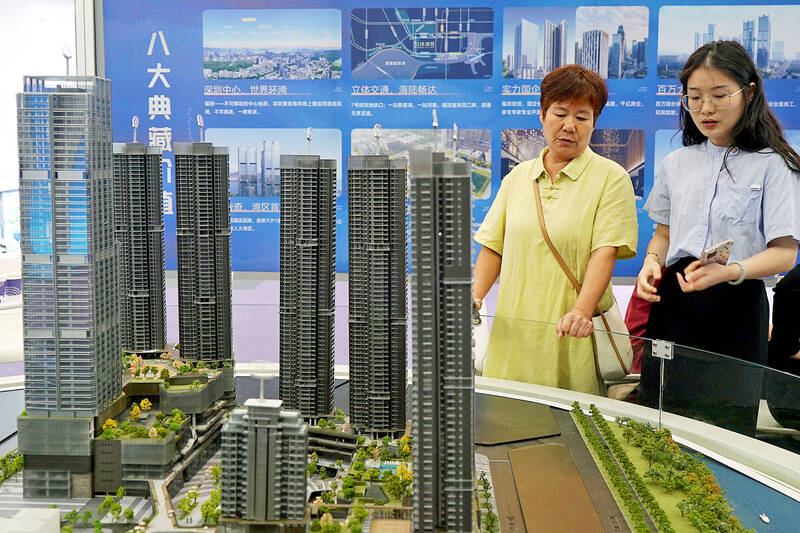China is planning to cut taxes for home purchases as the government dials up fiscal support to revive a moribund housing market, people familiar with the matter said.
Regulators are working on a proposal that would allow mega cities including Shanghai and Beijing to cut the deed tax for buyers to as low as 1 percent from as much as 3 percent, the people said.
City governments have leeway to tweak the rules, they added.

Photo: Reuters
The plan, hinted at on Friday by Chinese Minister of Finance Lan Foan (藍佛安), underscores Beijing’s increased willingness to use fiscal tools to shore up the sluggish economy along with monetary easing.
Under the latest proposal, top-tier cities are expected to be allowed to scrap the distinction between ordinary and luxury homes, which would substantially lower purchasing costs for people seeking to upgrade their residences, people familiar with the matter said.
In Shanghai for example, apartments bigger than 144m2 are considered “non-ordinary.”
If realized, the move would help reduce cost of home buying and boost property sales, said Raymond Cheng (鄭懷武), head of China property research at CGS International Securities Hong Kong Ltd (銀河證券).
A years-long property crash has wiped out billions of dollars in household wealth, adding to deflationary pressures. Economists are calling for more fiscal support to ensure China’s about 5 percent economic growth target is met this year.
The property deed tax cut is consistent with earlier expectations that the government would issue fiscal policies helping the property sector, Morningstar Inc analyst Jeff Zhang said.
The plan to cut property taxes is set to reignite investors’ expectations for large-scale stimulus to boost domestic demand and combat deflation after last week’s high-profile legislative meeting fell short of market forecasts.
China in the past two months unleashed its strongest package of policies to boost the property market, including cutting borrowing costs on existing mortgages, relaxing buying curbs in big cities and easing down payment requirements.
Last month, residential property sales rose for the first time this year, suggesting that support measures were helping to inject some confidence in buyers. That said, the recovery was lopsided, with state developers benefiting the most from the stimulus and buyers preferring existing homes.
The country also pledged last month to nearly double the loan quota for unfinished residential projects to 4 trillion yuan (US$552.87 billion). The announcement underwhelmed due to a lack of concrete numbers for special bonds to enable local governments to digest about 60 million unsold units.

IN THE AIR: While most companies said they were committed to North American operations, some added that production and costs would depend on the outcome of a US trade probe Leading local contract electronics makers Wistron Corp (緯創), Quanta Computer Inc (廣達), Inventec Corp (英業達) and Compal Electronics Inc (仁寶) are to maintain their North American expansion plans, despite Washington’s 20 percent tariff on Taiwanese goods. Wistron said it has long maintained a presence in the US, while distributing production across Taiwan, North America, Southeast Asia and Europe. The company is in talks with customers to align capacity with their site preferences, a company official told the Taipei Times by telephone on Friday. The company is still in talks with clients over who would bear the tariff costs, with the outcome pending further

NEGOTIATIONS: Semiconductors play an outsized role in Taiwan’s industrial and economic development and are a major driver of the Taiwan-US trade imbalance With US President Donald Trump threatening to impose tariffs on semiconductors, Taiwan is expected to face a significant challenge, as information and communications technology (ICT) products account for more than 70 percent of its exports to the US, Chung-Hua Institution for Economic Research (CIER, 中華經濟研究院) president Lien Hsien-ming (連賢明) said on Friday. Compared with other countries, semiconductors play a disproportionately large role in Taiwan’s industrial and economic development, Lien said. As the sixth-largest contributor to the US trade deficit, Taiwan recorded a US$73.9 billion trade surplus with the US last year — up from US$47.8 billion in 2023 — driven by strong

A proposed 100 percent tariff on chip imports announced by US President Donald Trump could shift more of Taiwan’s semiconductor production overseas, a Taiwan Institute of Economic Research (TIER) researcher said yesterday. Trump’s tariff policy will accelerate the global semiconductor industry’s pace to establish roots in the US, leading to higher supply chain costs and ultimately raising prices of consumer electronics and creating uncertainty for future market demand, Arisa Liu (劉佩真) at the institute’s Taiwan Industry Economics Database said in a telephone interview. Trump’s move signals his intention to "restore the glory of the US semiconductor industry," Liu noted, saying that

AI: Softbank’s stake increases in Nvidia and TSMC reflect Masayoshi Son’s effort to gain a foothold in key nodes of the AI value chain, from chip design to data infrastructure Softbank Group Corp is building up stakes in Nvidia Corp and Taiwan Semiconductor Manufacturing Co (TSMC, 台積電), the latest reflection of founder Masayoshi Son’s focus on the tools and hardware underpinning artificial intelligence (AI). The Japanese technology investor raised its stake in Nvidia to about US$3 billion by the end of March, up from US$1 billion in the prior quarter, regulatory filings showed. It bought about US$330 million worth of TSMC shares and US$170 million in Oracle Corp, they showed. Softbank’s signature Vision Fund has also monetized almost US$2 billion of public and private assets in the first half of this year,